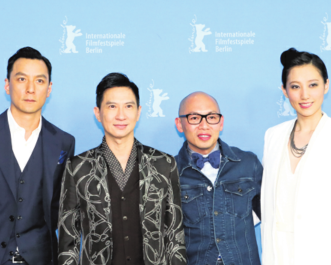
ZHANG FAN/XINHUA
Dante Lam (second from left) with main actors of his film That Demon Within at the Berlin Film Festival.
After a conspicuous and pride-busting absence from the three biggest European film festivals, Chinese movies staged a surprise comeback at the 64th Berlin International Film Festival, known as Berlinale, which runs from Feb 6 to 16. As many as three Chinese films have been selected for the 23-film-strong main competition, including No Man's Land, Ning Hao's dark take on humanity that took four long years to go through the censorship pipeline. The film, which opened on Dec 3, 2013, in China, was both a critical and commercial hit, raking in 260 million yuan at the box office.
The other two contenders have not been released in their homeland yet, but Massage is a well-known story adapted from Bi Feiyu's widely acclaimed novel. Last year saw the birth of both the stage play and the television drama series, and Lou Ye's film treatment could not possibly embed any narrative spoilers. However, those who love the story, about a bunch of blind people who make a living from the massage business, may compare the different artistic approaches and conclude which one successfully comes out of the shadow of the literary original.
Black Coal, Thin Ice is set against the wintry landscape of Northeast China where the desolate scenery may reflect the mental state of the main characters. Director Diao Yinan loves film noir, but his style of portraying murder and misery is uniquely his own, where the cop, the perpetrator and the hapless bystander are not suave or sophisticated enough to spew bon mots. "I love black because it gives a sense of discontinuity, and it blends social realism with surrealistic fantasy; I love to subvert conventions," Diao explains.
More Chinese-language films are competing in the Panorama section: Dante Lam's supernatural thriller That Demon Within, Fruit Chan's adaptation of an online novel The Midnight After, Tsai Ming-liang's new segment of his experimental Walker series titled Journey to the West, The Rice Bomber by Cho Li, Ice Poison by Midi Z and Zhou Hao's auspicious debut The Night. This heavily Asian program is designed to promote art-house cinema with a clear auteur inclination.
Cao Baoping's Einstein and Einstein, about a teenage girl and her dog, is among the First Generation sidebar. The Movable Feast is picked for the Culinary Cinema program.
Besides those in competition, several Chinese-language films are on sale at the European Film Market, which runs alongside Berlinale. Most notable is The Golden Era, Ann Hui's upcoming biopic on female writer Xiao Hong. The pairing of Hui and Tang Wei is keeping many cinephiles in blissful prayer for something great.
Back to the main competition, Hong Kong actor Tony Leung Chiu Wai, a favorite with auteur filmmakers, is sitting on the judging panel, further arousing interest in China. As many as 73 percent polled on Sina.com were hopeful that Chinese-language films may bring home some kind of trophy.
We recommend:
